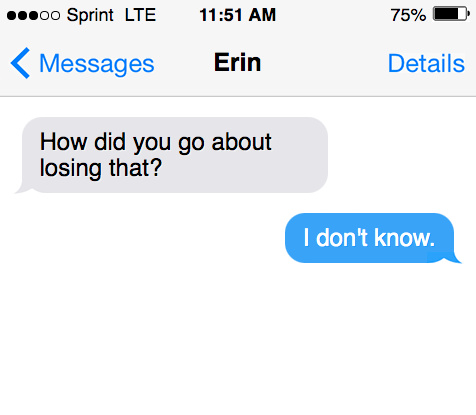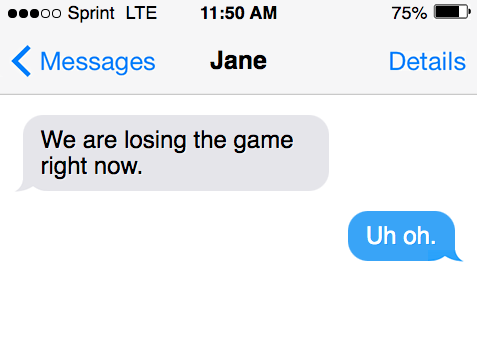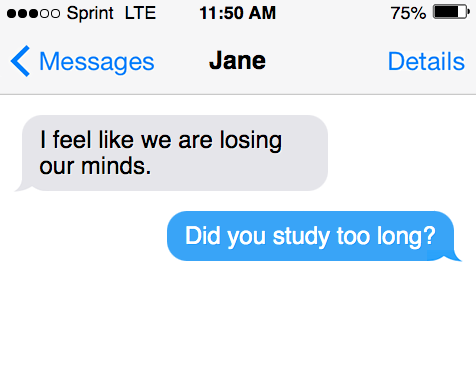How can someone use the verb “lose” in the correct way? What’s the difference between lose vs. loose? These two words can sound similar when pronounced them. And the additional “o” letter doesn’t distinguish them that dramatically. However, their meanings can be entirely different.
What is the definition of “lose?”
“Lose” is defined as to stop having something because you do not know where it is, misplace it, or it is taken away from you. According to Merriam-Webster, the word “lose” is to “be unable to find or have at hand.”
Here are some example sentences using “lose:”
- I can’t find my phone! I think I lost it.
- I’m worried that I will lose my keys again.
- Don’t lose your concentration!
What are the various tense forms of “lose?”
“Lose” is a regular verb, which means it forms its different tenses in the usual way. The base form or infinitive of “lose” is simply “to lose.” The present tense would be “I lose,” “you lose,” “he/she/it loses,” etc. The past tense would be “I lost,” “you lost,” and “he/she/it lost.”
The future tense would be “I will lose,” “you will lose,” and “he/she/it will lose.”
There are also present participle and past participle forms, which are used in conjunction with auxiliary verbs to form different verb tenses.
The present participle form is “losing,” and the past participle form is “lost.”

The etymology of the word “lose”
The word “lose” is from the Old English losian, which is derived from the Germanic root lausaz.
What is the definition of “loose?”
“Loose” has several different definitions, but the most common definition is “not tight or held together.”
Here are some example sentences using “loose:”
- The screws are loose, so the table is wobbling.
- Please don’t wear loose clothes around the machinery.
- I need to tighten this loose knob.
What are the various tense forms of “loose?”
“Loose” is an irregular verb, which means it does not form its different tenses in the usual way. The base form or infinitive of “loose” is simply “to loose.” The present tense would be “I loose,” “you loose,” “he/she/it looses,” etc. The past tense would be “I loosed,” “you loosed,” and “he/she/it loosed.”
The future tense would be “I will loose,” “you will loose,” and “he/she/it will loose.”
There are also present participle and past participle forms, which are used in conjunction with auxiliary verbs to form different verb tenses.
The present participle form is “loosing,” and the past participle form is “loosed.”
Does “lose” and “loose” have different meanings?
Yes, “lose” and “loose” have different meanings. “Lose” means to stop having something because you do not know where it is, misplace it, or it is taken away from you. “Loose” means “not tight or held together.”

When to use “lose?”
You would use the word “lose” when you can’t find something or if it’s taken away from you. For example, “I lost my keys” or “Don’t lose your concentration.”
When to use “loose?”
You would use the word “loose” when describing something that is not held together or is not tight. For example, “The screws are loose” or “Please don’t wear loose clothes around the machinery.”
What about the word “loosen?” “Loosen” is a word that means the same thing as “loose.” You can use it in place of “loose” in some of the verb form contexts. For example, “Loosen all of the screws” or “Loosen the clothes around the machinery.” “Loosen” meaning “to relax.” When using “loosen” in the present tense form, “loosening” is the correct form. For example, “I will be loosening the screws shortly.”
Examples of “lose” getting used in a sentence
The verb “lose” is “to fail to win, to misplace, or to free oneself from something or someone.”
- We got a defeat in the game. We didn’t win, we lost. I don’t want to lose again. I don’t want to fail.
- The winning team took home the championship. It doesn’t feel good to lose.
Examples of “loose” getting used in a sentence
The verb to “set free or release.”
- Do you have any loose change on you?
- The company wants to loose money this quarter. They sense that the market is going to take a turn to growth. And they are putting the right on.
- The moment there is a loose screw, the machine operator needs to fix this.
Examples of “losing” in a sentence:
- We are losing money quickly. We need to make an action quickly in order to change this.
- I am losing weight every week. The exercise routine that I put together works.
The difference between loose vs. lose is apparent. They can be confusing, since they are so close together in both spelling and pronunciation. Remember, “loose” means to “not have something tightly fixed in place.” While to “lose” is to “no longer have.” “Loose” is an adjective that is typically used to describe things that aren’t tight or can be set free/released.

Is it “loosing” or “losing?”
Is it “losing” when referring to something that is not winning. And “loosing” is not a correct word in American English.
Examples:
- “We are losing the big game right now.”
- “I feel like I am losing my mind.”
Sources
- Reconstruction:Proto-Germanic/lausaz – Wiktionary
- *lausaz etymology in Proto-Germanic | Etymologeek.com
- losian – Wiktionary
- Past Participle: Definition and Examples – Grammar Monster
- Meaning of lose in English – Cambridge Dictionary
- LOSE (verb) definition and synonyms – Macmillan Dictionary
Inside this article
Fact checked:
Content is rigorously reviewed by a team of qualified and experienced fact checkers. Fact checkers review articles for factual accuracy, relevance, and timeliness. Learn more.
Core lessons
Glossary
- Abstract Noun
- Accusative Case
- Anecdote
- Antonym
- Active Sentence
- Adverb
- Adjective
- Allegory
- Alliteration
- Adjective Clause
- Adjective Phrase
- Ampersand
- Anastrophe
- Adverbial Clause
- Appositive Phrase
- Clause
- Compound Adjective
- Complex Sentence
- Compound Words
- Compound Predicate
- Common Noun
- Comparative Adjective
- Comparative and Superlative
- Compound Noun
- Compound Subject
- Compound Sentence
- Copular Verb
- Collective Noun
- Colloquialism
- Conciseness
- Consonance
- Conditional
- Concrete Noun
- Conjunction
- Conjugation
- Conditional Sentence
- Comma Splice
- Correlative Conjunction
- Coordinating Conjunction
- Coordinate Adjective
- Cumulative Adjective
- Dative Case
- Determiner
- Declarative Sentence
- Declarative Statement
- Direct Object Pronoun
- Direct Object
- Diction
- Diphthong
- Dangling Modifier
- Demonstrative Pronoun
- Demonstrative Adjective
- Direct Characterization
- Definite Article
- Doublespeak
- False Dilemma Fallacy
- Future Perfect Progressive
- Future Simple
- Future Perfect Continuous
- Future Perfect
- First Conditional
- Irregular Adjective
- Irregular Verb
- Imperative Sentence
- Indefinite Article
- Intransitive Verb
- Introductory Phrase
- Indefinite Pronoun
- Indirect Characterization
- Interrogative Sentence
- Intensive Pronoun
- Inanimate Object
- Indefinite Tense
- Infinitive Phrase
- Interjection
- Intensifier
- Infinitive
- Indicative Mood
- Participle
- Parallelism
- Prepositional Phrase
- Past Simple Tense
- Past Continuous Tense
- Past Perfect Tense
- Past Progressive Tense
- Present Simple Tense
- Present Perfect Tense
- Personal Pronoun
- Personification
- Persuasive Writing
- Parallel Structure
- Phrasal Verb
- Predicate Adjective
- Predicate Nominative
- Phonetic Language
- Plural Noun
- Punctuation
- Punctuation Marks
- Preposition
- Preposition of Place
- Parts of Speech
- Possessive Adjective
- Possessive Determiner
- Possessive Case
- Possessive Noun
- Proper Adjective
- Proper Noun
- Present Participle
- Prefix
- Predicate



